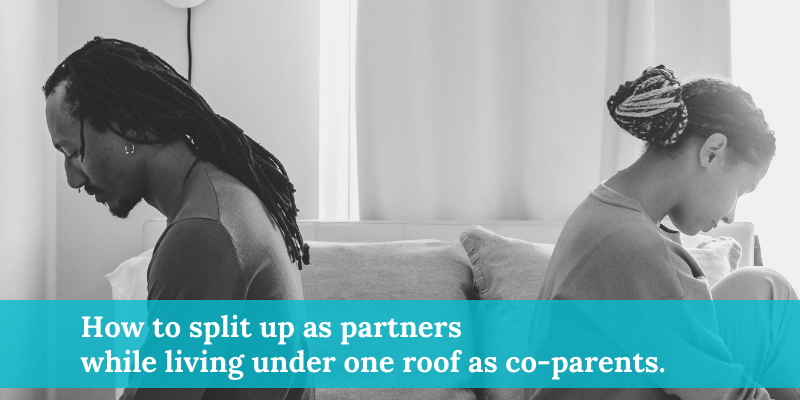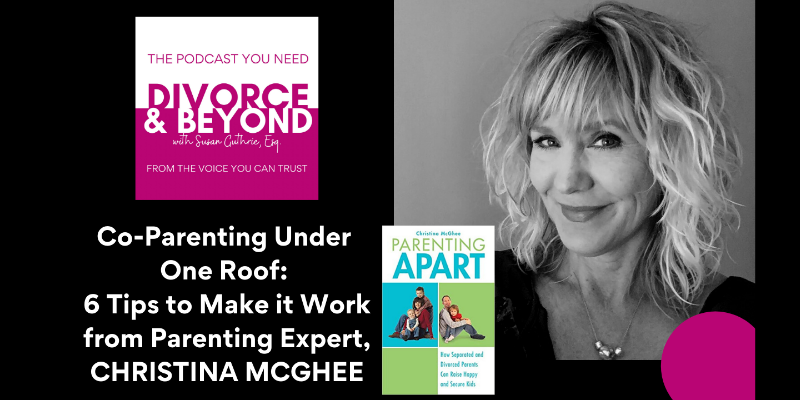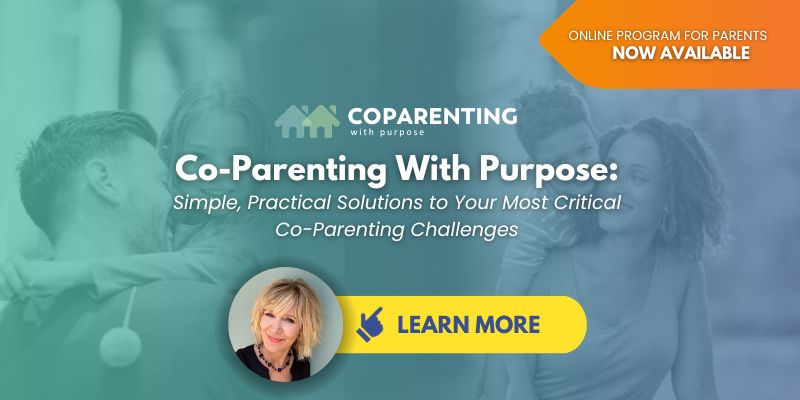6 Tips for Coparenting When You’re Getting Divorced But Still Living In The Same House.

When it comes to raising children out of two homes post-divorce, it’s expected that co-parents will encounter a host of challenges along the way.
However, there’s one divorce challenge that doesn’t get talked about very much, and it happens more often than you think. How to split up while living under one roof.
Whether it’s due to COVID, limited financial resources, or staying put temporarily for the kids, lots of separating parents are having to figure out how to part ways while occupying the same space.
Which is why I teamed up with podcasting pro, Susan Guthrie host of the Divorce and Beyond podcast to talk about what co-parents can do to make the best of what often feels like a less than ideal situation.
If you are a parent who has just started this journey or one that has been in it for a while but is looking for support, you can listen in to my two-part conversation ( PART ONE | PART TWO ) with Susan or you can catch it on youtube.
GETTING A DIVORCE CAN BE MORE CHALLENGING WHEN YOU LIVE IN THE SAME HOUSE, HOWEVER, THERE CAN BE SOME BENEFITS FOR YOU AND YOUR KIDS.
While breaking up is definitely harder to do when your soon-to-be Ex-partner lives across the hall, your break-up doesn’t have to be filled with icy glares, tolerated silence, or all-out brawls.
Actually, sharing the same address while you sort things out, can offer several benefits for you and your kids, if you leverage it the right way.
Two of the biggest advantages are:
- Your children have time to transition.
Instead of kids having to jump into adjusting to life in two households, parents not being in the same place, and a new parenting schedule. Children have some emotional space to deal with their feelings about the divorce and transition into the idea of life being different.
- The two of you have time to adjust to being co-parents.
For most co-parents, the transition of parenting as a “we” to parenting as a “me” offers a pretty steep learning curve. Even if you feel like you do most of it on your own, having an extra set of hands around can make a bigger difference than you think. Instead of waiting until you are physically separated, the two of you (and your children) have a chance to get used to the concept of “parenting solo” and trying out time-sharing arrangements. Something not working well? You have the ability to tweak your plan and try again.
HOW TO MANAGE DIVORCE WHEN YOU LIVE IN THE SAME HOUSE.
If you’ve found yourself in this situation and want to make the most of your living arrangements while you’re breaking up, here are a couple of tips to keep in mind.
DON’T JUST WING IT.
If you are 100% crystal clear about your decision to divorce then you and your co-parent should start creating a plan. The focus needs to be on how your relationship and family life will need to change for now. All too often separating parents fall into the trap of making impulsive decisions or just winging it. The end result often leads to added tension, increased stress/anxiety for your children, and lots of misunderstandings.
TBH, one of the most important things you can do as a separating couple in the beginning stages is think about key issues like:
• How long you’ll be living in one home.
• Deciding how to share care of children.
• When and how to separate finances.
• Providing each other with space both emotionally and physically.
• How you will shield children from tension and disagreements.
• Managing sleeping arrangements.
• Adjusting the expectations you have of each other. (What will need to change and what will stay the same?)
• Developing a consistent plan for sharing information about the children
• How you will redefine your relationship (While you may no longer be partners you will always be parents.)
It’s also extremely helpful to think about the timing of your transition.
Do your best to put a time frame on how long the two of you plan to live in one home. While things may need to be adjusted down the road, having a time fr in mind can help both of you avoid feeling like you’re locked into a permanent state of limbo.
Establishing the when and how isn’t just important for your own personal mental health. Having a timeframe will additionally help you navigate other important issues like when to break the news to your kids and how to prepare them for this big change.
STAY FOCUSED ON WHAT YOU HAVE IN COMMON
While staying in the same home may not be your ideal situation, it’s valuable to stay connected to “why” you’re doing it.
Whether it’s due to the pandemic, financial reasons, or easing into family change, the “why” usually holds common ground for co-parents. AND regardless of how you feel about each other chances are you will both always agree that making things easier for their KIDS is a top priority.
Do your best to stay dialed into how you can make this situation as stress-free as possible for your children.
To help you find your co-parenting focus, consider creating a guiding principle.
A guiding principle involves identifying your shared values as parents. Think of it as defining a direction, destination, or goal for your co-parenting relationship. Instead of honing in on all the ways you disagree, it helps you get clear about the bigger picture…making things work for your kids.
While each of you might meet that objective in different ways, the overall goal or destination is the same.
A joint guiding principle might be something like:
“Although our marriage has ended our connection as parents will continue. During this time we will do our best to stay committed to maintaining a conflict-free household for our children.“
If you’re dealing with a co-parent who isn’t willing to cooperate… developing a guiding principle on your own can still hold value.
An example of an individual guiding principle might be…
“I will manage my parenting relationship with integrity regardless of my co-parent’s actions. Now and in the future, I am dedicated to doing everything I can to give my children the childhood they deserve.”
To help you through those moments when you may need to bite your tongue, be the bigger person or hold onto that comment you’d love to let fly, you can refer back to your guiding principle. Think about writing it on a note card, making it a screensaver on your phone or computer, putting it in your purse or your wallet, writing it on the back of your children’s picture, or keeping it somewhere you’ll see it often.
SET SOME GROUND RULES
Once the two of you have set a time frame and have an idea of how you will handle the logistics, consider setting some general ground rules. How will you communicate information to one another as co-parents to keep things calm and consistent?
Pro Tip #1:
Give some thought to trying a co-parenting app during this time. Not only will it put all of your ongoing communication into one location, practicing now may also help you begin to transition that communication from partners to co-parents.
How will you behave around the children? If there’s a disagreement and tempers start to flare, how you will offset the tension so that your kids don’t get a ring-side seat to your next brawl.
Pro Tip #2:
Create a short-written agreement on how to manage disagreements. Options might include: when a discussion becomes heated, you both agree that you will each respect the other person’s right to take a break and walk away.
And yes, (in case you were wondering) you should write it down. Written agreements help ensure you both have the same understanding and they provide clear accountability.
Keep in mind, that it isn’t just arguing and fighting that makes kids uncomfortable. Unspoken tension (i.e. ignoring each other, rigid body language, or one-word responses) also leaves children feeling extremely anxious. To keep day-to-day tension for your kids in check, you might make a commitment to treat one another with the same level of courtesy you would extend to a colleague or coworker.
When tensions are running high, do your best to manage your anger, hurt, or resentment constructively not destructively.
Further, if calm communication isn’t an option with your co-parent, enlist the help of a trusted friend or family member you both respect. Often adding a neutral voice to the conversation can keep strong emotions at bay. Use this person to facilitate a conversation about setting ground rules and mapping out a general agreement.
BE CLEAR WITH YOUR KIDS
Although staying in one home provides kids with time to adjust, it can also create some confusion. Kids may wonder if you can manage living together, why do you need to get a divorce? Why can’t things stay the same?
Overall, it’s important for your kids to understand why you’ve decided to keep living in the same house.
Regardless of the “why” your children need to be reassured that while the marriage has ended, the family has not. Kids benefit from understanding that although the love shared between parents has changed, the love you each have for them is an enduring love.
Along with the “why,” your kids need to see you managing your relationship differently.
Which brings us to #5.
AVOID DOING WHAT YOU’VE ALWAYS DONE
One mistake lots of co-parents make (whether they stay in the same home or not) is making the decision to break up yet continue to coexist as a couple. Meaning… nothing really changes for you or your children.
Let’s face it, you have a history together, and breaking free of that history is no easy task.
A couple I coached several years ago, found themselves caught in this vicious cycle. After telling the children about their decision, they continued to do what they had always done. Not only did it really confuse their children, it also gave their kids a false sense of hope that maybe things wouldn’t really change.
Additionally, it also kept this couple stuck in a cycle of resentment and bitterness. Each was holding onto the idea of being independent and would resent the other for keeping things status quo.
When you always do what you’ve always done, you’ll always get what you‘ve always got.
Once you decide to separate, make a conscious effort to communicate your expectations of one another and how you will start transitioning into doing things differently and separately.
One way to get started is to discuss cultivating new skills and routines.
For example, let’s say Dad handles tuck-in every night for the kids. While co-parents are in one home, Mom can work on managing that responsibility on certain nights. Making that shift early on can really help down the road when kids start transitioning into two homes.
Maybe Mom is the one who handles homework every day. Dad may need to clock in some hours doing Math with Alex a couple of days a week.
DON’T JUST FOCUS ON WHAT WENT WRONG
When parents don’t have an emotional investment in each other anymore they tend to zero in on everything that didn’t work and overlook the things that did.
While there are clearly reasons you’re breaking up, just focusing on what went wrong won’t help you in the long run. This is especially true when it comes to the challenges of co-parenting in one house.
Think about times when you have managed problems well together and try to build on those successes.
Case in point, I had a client that was still in the same house with her co-parent. She had a lot of anxiety about how she and the other parent would ever agree on a parenting plan. She was so focused on all the reasons they couldn’t agree that she overlooked the fact that they had been able to work out the finances on their own with no problems. They were both in agreement they wanted to avoid court. AND that her co-parent had agreed to read a parenting book before they talked about a parenting plan.
When she took the time to acknowledge what was working it changed her perspective about what might be possible.
I know absolutely none of this is easy, however, if you want to minimize stress and conflict for your kids now and in the future, these suggestions can help you get headed in the right direction. And if you want more tips or insights, listen to my two-part interview ( PART ONE | PART TWO ) with Susan Guthrie on the Divorce and Beyond podcast.
BTW, I’ve given many interviews and shared a wealth of helpful information for separating parents. Be sure to check out some of those episodes here!
x,







